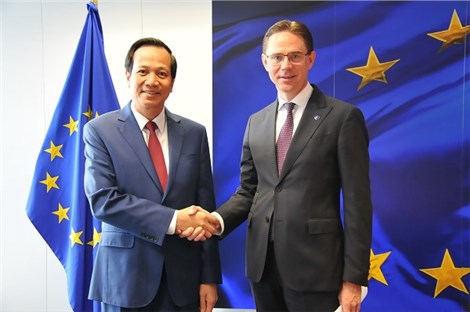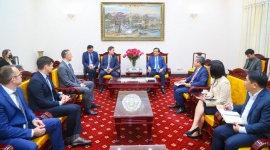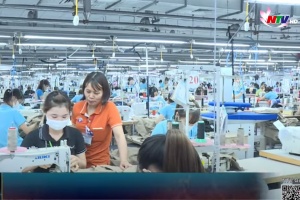Vietnam reasserts to realise international commitments on labour
Minister of Labour, Invalids and Social Affairs Dao Ngoc Dung paid a working visit to the European Union and Belgium on June 20-21 to speed up the signing of the EU-Vietnam free trade agreement (EVFTA) and reaffirm Vietnam’s efforts to realise international commitments on labour.

Discussions at the working sessions focused on issues related to labour commitments in the chapter on trade and sustainable development of the EVFTA – which has drawn attention of the EU during the preparation process for the signing and ratification of the agreement.
Minister Dung informed EU and Belgian leaders of the Vietnamese National Assembly’s approval of a resolution on Vietnam’s accession to the ILO’s Convention 98 on the Right to Organise and Collective Bargaining on June 14.
He stressed that together with trade and investment cooperation, Vietnam has paid special attention to inclusive and sustainable development, with the people put at the centre.
The official showed his hope that the EU and Vietnam will maintain close cooperation to speed up the signing of the EVFTA and the EU-Vietnam Investment Promotion Agreement (EVIPA) in the coming time and ratify them within this year.
The EU and Belgian sides spoke highly of Vietnam’s efforts, especially in ratifying the Convention 98 and in revising and supplementing its Labour Code, which are considered one of the decisive conditions for the European Council’s consideration of allowing the European Commission to sign the EVFTA at the soonest time.
-
 Hundreds of job opportunities for people with disabilities in Hanoi
17-04-2024 10:22 29
Hundreds of job opportunities for people with disabilities in Hanoi
17-04-2024 10:22 29 -
 Promote human resource cooperation between Vietnam and Japan
10-04-2024 10:04 39
Promote human resource cooperation between Vietnam and Japan
10-04-2024 10:04 39 -
 Vietnam sends nearly 13,000 workers abroad in March
09-04-2024 11:28 26
Vietnam sends nearly 13,000 workers abroad in March
09-04-2024 11:28 26
-
 Promote labour relations between Vietnam and Hungary
18-03-2024 09:55 15
Promote labour relations between Vietnam and Hungary
18-03-2024 09:55 15 -
 Discovery of genetic variants related to Autism Spectrum Disorder in Vietnamese children
08-03-2024 16:09 38
Discovery of genetic variants related to Autism Spectrum Disorder in Vietnamese children
08-03-2024 16:09 38 -
 Vietnam puts women’s empowerment at centre of development: UNFPA Vietnam
08-03-2024 14:27 27
Vietnam puts women’s empowerment at centre of development: UNFPA Vietnam
08-03-2024 14:27 27
English Review


Hundreds of job opportunities for people with disabilities in Hanoi
English Review | 17-04-2024 10:22 29







